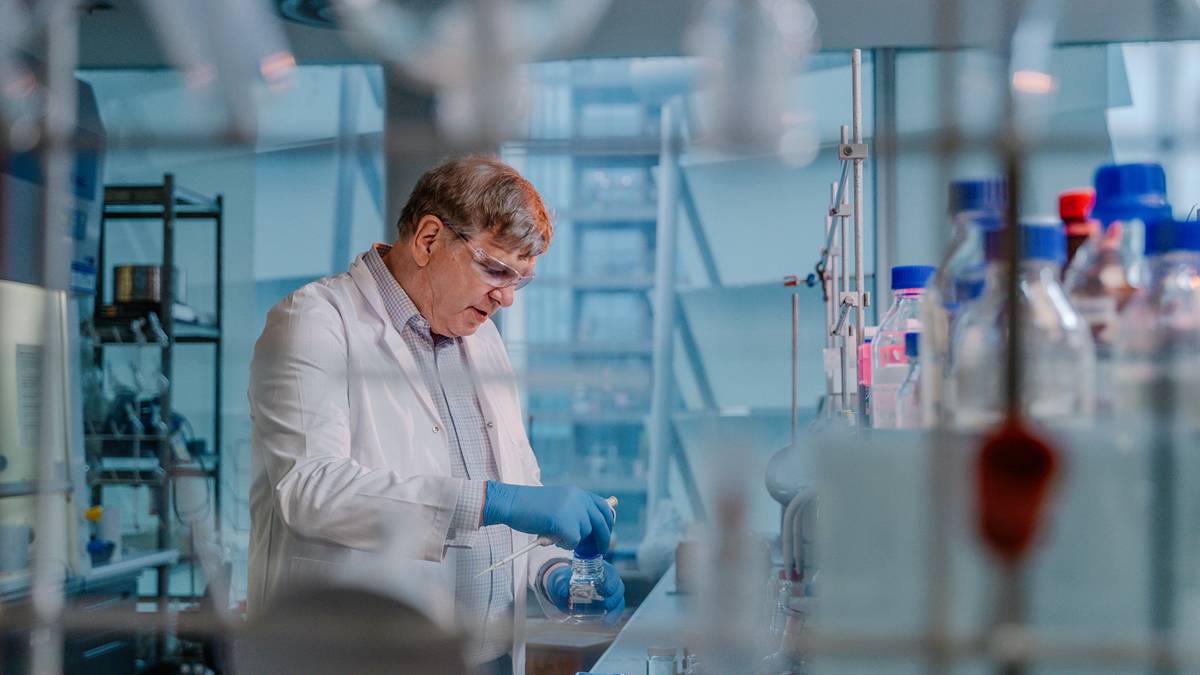The storied Australian drug developer turning his skills to funds management
The co-developer of one of only a few US-approved, locally-developed drugs, Professor Andrew Wilks has created a new fund to sniff out more winners.

Professor Andrew Wilks has founded a new biotech fund targeting local early-stage medical research
The fund, Synthesis Bioventures, aims to raise $75 million and so far has invested $15 million
Wilks co-developed the FDA-approved myelofibrosis drug, Ojjaara
Synthesis Bioventures founder Professor Andrew Wilks is more qualified than most fund managers to know about what makes drug development tick, having co-invented a cancer therapy approved by the US Food & Drug Administration last year.
The drug in question is Ojjaara (momelotinib), for the bone marrow cancer myelofibrosis.
Developed by the formerly ASX-listed Cytopia, the drug changed ownership several times before GlaxoSmithKline acquired it in 2022 for US$1.9 billion ($2.6 billion) – the highest ever paid for an Australian-developed drug.
Steeped in academia, the Liverpool, UK-born Wilks did the equivalent of the circus performer running away to be an accountant.
I was very much a boffin and was very dismissive of venal capitalism,” he says.
“I had a mid-life crisis in the mid 90s and thought what am I doing? It’s great to have all this knowledge but how do you have an impact on other humans?”
Wilks founded Cytopia and, eventually, Synthesis Medcam Research – a cash flow business based on chemistry services.
“We built a team of 350 people in China and with the profits from that we would find new projects,” he says.
“The idea was to move those projects to a point where a transaction would happen, and we did that three or four times.”
About the fund
Synthesis Bioventures aims to raise $75 million to support local early-stage medical research, on the fast track from discovery to monetisation such as via an IPO or takeover.
So far, the fund has raised more than $25 million and has committed about $15 million into four preclinical ventures. The fund will invest up to $1 million in ventures in the raw discovery phase and up to $5 million in more advanced ones.
The fund’s interest lies in small molecule drugs and cell and molecular therapies, with a bent towards cancer immunology, cardiovascular disease and neuroinflammation (such as Alzheimer’s disease).
“But we look at anything,” Wilks says.
“There’s an embarrassment of riches, so it is not hard for us to pick really high-quality projects with a high degree of potential success.”
Show me the money
The fund’s four investments to date are:
Aculeus Therapeutics, which is developing a small molecule drug to treat peadiatric cancers by modulating the immune system. The company hopes to be in the clinic by March 2025.
Having received funding support of $30 million – including $3.5 million from Synthesis Bioventures and $10 million from the fund’s shareholders - Aculeus plans to list on the ASX within the next 12 to 18 months.
Anaxis Pharma which is developing a novel treatment for inflammatory disease and is currently raising capital to start a first-in-human trial in 2025.
The first indication is likely to be kidney reperfusion injury (kidney damage from a heart or toxic poisoning).
Skin2Neuron which is developing a treatment for the difficult Alzheimer's disease and other neurodegenerative disorders and is expected generate clinical data within 24 to 30 months.
Qubigen which has developed an AI-based drug discovery platform.
The fund also has a joint venture, or ‘nursery’, called Catalyst Therapeutics, with the Walter and Eliza Hall Medical Research Institute. Anaxis was a spin-off from this venture.
Dealing with imperfect data
Wilks says the investment propositions are never perfect.
“There might be holes in the data or something missing. Because we are professional scientists in our own right, we can help improve the investment proposition at an early stage.”
The fund has 25 to 30 projects in its pipeline, but most won’t make it through the “filtration pyramid”.
“Either the science is not correct, and we decide to put them out of their misery,” Wilks says. “Or we do a deeper dive and decide it is good science, but not a business proposition.”
Synthesis Bioventures insists on board representation on the investee companies which, Wilks insists, is “not a threat but helpful for everyone.”
Setting the tone, the fund also has its own governance board, headed by Dimerix CEO Dr Nina Webster.
Inspired by altruism – and tax breaks
The fund’s investors are family offices and high net worth individuals - many of them are “fat and happy” investors in the old chemistry business.
The fund’s biggest investor is Wilks himself and his partner, immunologist Dr Mary Saleh.
Wilks says the investors are dawn strongly by altruism, but there’s a tax break as well: the fund is an Early Stage Venture Capital Limited Partnership, which confers benefits including no tax on the first $200 million of profits and a tax offset of up to 10% of the value of eligible contributions.
Wilks acknowledges that drug development is high risk, but his investments today have conferred a “surprisingly high” success rate.
As a corporate structure, Synthesis Medchem generated an internal rate of return of more than 50% (as of 2021 – the number has not been recalculated since then).
“A ten-bagger (a 1000% return) would be acceptable,” Wilks says of the new fund.
“We are very frank about the risk. In the private sector you would have to be a lunatic to invest in private biotech without a scientific advisory board like the one we have, or a without building the portfolio we have.”
Don't list too early
Wilks reckons that before biotechs list, they should at least have clinical data or are heading into phase II stage.
“I listed Cytopia on the back of animal experiments and that was way too early,” he says.
“On the ASX bad stuff gets funded, good stuff doesn’t necessarily get funded and people buy on the rumor and sell on the fact.
“Sometimes value is not recognised and it is disappointing when rubbish gets valued highly.”
Rubbing shoulders with Albo
Wilks reckons he has the best job on the planet.
“It is such a creative and joyous process when you have the potential next therapeutic, whether it be for a type of cancer or a nasty rash”.
Adding to the joyous vibe, Wilks and momelotinib co-inventor Dr Chris Burns in October received the Prime Minister’s Award for Innovation (Burns heads the listed cancer and fibrotic disease play Amplia (ASX:ATX) ).
The accolade conferred the duo not just with an audience with Canberra’s movers and shakers – their names were enshrined in Hansard – but a nice medal and a cheque.
“But the glory alone was enough,” he says. “I still haven’t got off cloud nine.”
Originally published as The storied Australian drug developer turning his skills to funds management




